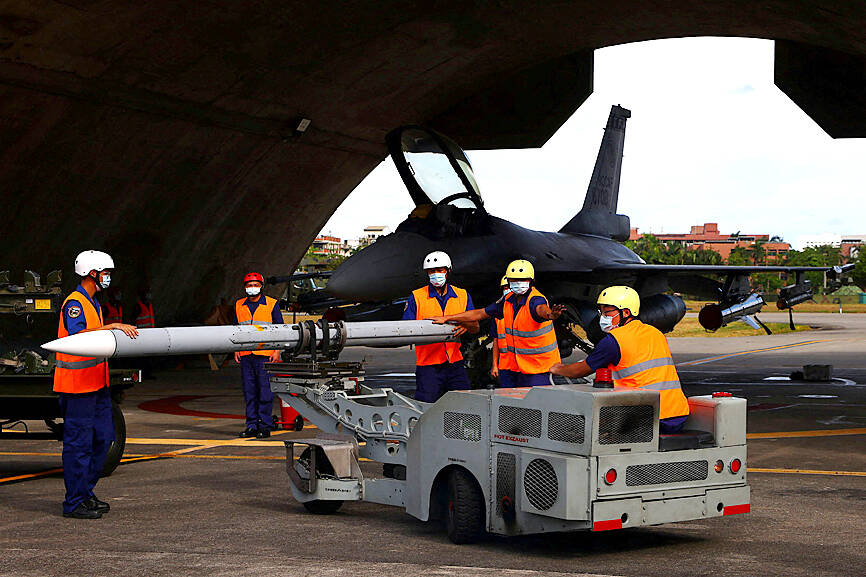The US’ announcement of an arms sales package to Taiwan that includes one of the most advanced missiles in service on US warplanes underlines Washington’s trust in Taipei, a military expert said.
The US Defense Security Cooperation Agency on Wednesday announced a US$619 million package that includes 100 AGM-88B high-speed anti-radiation missiles (HARM), 23 HARM training missiles, 200 AIM-120C-8 advanced medium-range air-to-air missiles (AMRAAM), four AIM-120C-8 AMRAAM guidance systems and 26 LAU-129 multipurpose launchers for F-16 jets.
If approved by the US Congress, the package would mark the first time the US has sold Taiwan the AIM-120C-8 missiles, which are also fielded on advanced US jets including the F/A-18, F-22 and F-35.

Photo: Ann Wang, Reuters
Institute of National Defense and Security Research fellow Su Tzu-yun (蘇紫雲) said the package has political significance in that the AIM-120C-8 is deployed on some of the US’ most advanced aircraft.
This demonstrates the deepening bilateral ties between the nations, and the trust the US has in Taiwan, he said.
The AIM-120C-8 missile — which features a two-way data link and improved navigation using a GPS-enhanced inertial measurement unit — is often deployed on planes in combination with AIM-9 Sidewinder missiles for short to mid-range combat. It is also used by Japan’s air force.
Su said the missile features a greatly increased range of 160km — about 1.5 times that of the previous AIM-120C-7 missile.
Its expanded no-escape envelope and high-angle off-boresight capability mean that enemy aircraft within firing range are less likely to escape, he said.
While a pilot traditionally has to lock on to the tail of an enemy aircraft using a targeting system before initiating a strike, the off-boresight launch capability allows pilots to fire the missiles at extreme angles, he said.
This capability, coupled with a helmet-mounted cueing system, means that pilots would no longer need a clear line of sight on a target, and would be able to fire a missile at an enemy aircraft flanking them just by looking over their shoulder, he said.
Taiwan first acquired 50 AGM-88B missiles from the US during former US president Donald Trump’s administration, he said.
With the addition of the proposed 100 AGM-88B missiles, it would bolster the air force’s ability to target Chinese People’s Liberation Army (PLA) coastal radar stations, communications stations and marine radars, he said.
Although identified in the announcement as simply AGM-88B, it is widely believed that the missiles being proposed for sale are upgraded units from the 2018 HARM control section modification program that reportedly have an increased range of 180km.
Chieh Chung (揭仲), an associate research fellow with the Chinese Nationalist Party (KMT) think tank National Policy Foundation, said that the Ministry of National Defense “took a step in the right direction” by seeking to purchase the missiles, as it would expand Taiwan’s arsenal and be an effective deterrent against PLA warships and aircraft.
The AGM-88B missile would allow the air force to target the radar systems on PLA ships during war, potentially forcing them to retreat, he said.
They could also be deployed against radar stations along China’s southeastern coast, he added.
If the air force can suppress enemy fire, creating a window for a counterstrike, Indigenous Defense Fighters carrying domestically developed Wan Chien air-to-ground missiles could deter PLA forces from deploying missiles against Taiwanese aircraft, he said.

The disruption of 941 flights in and out of Taiwan due to China’s large-scale military exercises was no accident, but rather the result of a “quasi-blockade” used to simulate creating the air and sea routes needed for an amphibious landing, a military expert said. The disruptions occurred on Tuesday and lasted about 10 hours as China conducted live-fire drills in the Taiwan Strait. The Civil Aviation Administration (CAA) said the exercises affected 857 international flights and 84 domestic flights, affecting more than 100,000 travelers. Su Tzu-yun (蘇紫雲), a research fellow at the government-sponsored Institute for National Defense and Security Research, said the air

Taiwan is to commence mass production of the Tien Kung (天弓, “Sky Bow”) III, IV and V missiles by the second quarter of this year if the legislature approves the government’s NT$1.25 trillion (US$39.78 billion) special defense budget, an official said yesterday. Commenting on condition of anonymity, a defense official with knowledge of the matter said that the advanced systems are expected to provide crucial capabilities against ballistic and cruise missiles for the proposed “T-Dome,” an advanced, multi-layered air defense network. The Tien Kung III is an air defense missile with a maximum interception altitude of 35km. The Tien Kung IV and V

Trips for more than 100,000 international and domestic air travelers could be disrupted as China launches a military exercise around Taiwan today, Taiwan’s Civil Aviation Administration (CAA) said yesterday. The exercise could affect nearly 900 flights scheduled to enter the Taipei Flight Information Region (FIR) during the exercise window, it added. A notice issued by the Chinese Civil Aviation Administration showed there would be seven temporary zones around the Taiwan Strait which would be used for live-fire exercises, lasting from 8am to 6pm today. All aircraft are prohibited from entering during exercise, it says. Taipei FIR has 14 international air routes and

Taiwan lacks effective and cost-efficient armaments to intercept rockets, making the planned “T-Dome” interception system necessary, two experts said on Tuesday. The concerns were raised after China’s military fired two waves of rockets during live-fire drills around Taiwan on Tuesday, part of two-day exercises code-named “Justice Mission 2025.” The first wave involved 17 rockets launched at 9am from Pingtan in China’s Fujian Province, according to Lieutenant General Hsieh Jih-sheng (謝日升) of the Office of the Deputy Chief of the General Staff for Intelligence at the Ministry of National Defense. Those rockets landed 70 nautical miles (129.6km) northeast of Keelung without flying over Taiwan,